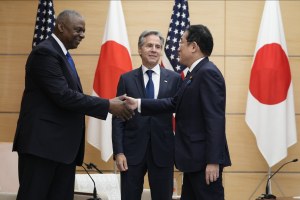In a crisis over the Senkaku Islands, the US public favors sending additional troops to Japan—but no aid to retake the territory.
The 2024 Chicago Council Survey and a series of Chicago Council-Ipsos surveys conducted throughout summer and fall 2024 find Americans express positive views of Japan and the US-Japan security relationship. And in a shift from prior polls, Americans now say the United States should strengthen the US-Japan alliance in order to offset China’s power and uphold regional order. But Americans remain concerned about potential military conflict with China and oppose committing US troops to conflicts between Japan and China, even in response to territorial seizures by Beijing.
Key Findings
- Six in 10 Americans (60%) say the United States should seek to strengthen the US-Japan alliance to uphold regional order and offset China’s power—up from 43 percent who said the same in 2018.
- Americans have warm views of Japan, giving Japan an average of 65 on a zero–100 thermometer scale, and almost two thirds (63%) are confident Japan can deal responsibly with world problems.
- Three-quarters of Americans (74%) say the US-Japan security relationship strengthens US national security, including similar majorities across party lines (78% Democrats, 74% Independents, 73% Republicans).
- Should China seize the disputed Senkaku Islands, Americans support imposing sanctions on China (70%), sending arms and military supplies to Japan (63%), and sending additional US troops to Japan (53%). However, only 39 percent favor sending US troops to help Japan retake the islands.
Bipartisan Majority of Americans Say US-Japan Relationship Strengthens US National Security
A large majority of Americans (74%) say the US-Japan security relationship strengthens US national security, including similar majorities across party lines (78% Democrats, 74% Independents, 73% Republicans). Of all the bilateral US security relationships asked about in the 2024 Chicago Council Survey, Japan and Germany (75% strengthens) are the two countries whose security relationships with the United States are most broadly viewed as strengthening US national security.
Rivals and Partners in Asia: Team America versus Team China
Reflecting the view that the US-Japan alliance strengthens US national security, most Americans view the United States and Japan as partners (84%), with relatively few today seeing the two countries as rivals (11%, a record low in Council polling). This holds true across party lines, with similar majorities of Democrats, Independents (86% each), and Republicans (81%) responding that the United States and Japan are mostly partners.
Americans also generally believe that America’s partners are Japan’s partners, and that America’s rivals are Japan’s rivals. For example, two-thirds of Americans view Japan and South Korea as partners. This likely reflects Americans’ generally warm views of both nations, and possibly the recent rapprochement between the leaders in Tokyo and Seoul. On the other side, most Americans view Japan and China as rivals (73%, 22% partners), nearly identical to how Americans view the US-China relationship (74% rivals, 22% partners). While this is not a new tendency, it has become somewhat more pronounced over the past six years.
Americans Favor Strengthening US-Japan Alliance to Offset China’s Rise
Americans’ warm views of Japan are nothing new. But now, the United States faces a strategic rivalry with a rising China—a country on which Americans have sharply soured in recent years. And while Americans are not said to lack self-confidence, they don’t see themselves as the most influential nation in Asia. For Americans, that title goes to China, which they rate at an average of 7.9 out of 10, with the United States trailing at 7.0—and Japan in third with an average influence of 6.6 out of 10.
Perhaps as a way to offset this perceived influence imbalance in Asia, Americans now say the US-Japan alliance itself needs to change in response to China’s rise. Six in 10 Americans (60%) say the United States should seek to strengthen the US-Japan alliance to uphold regional order and offset China’s power—up from 43 percent who said the same in 2018. Matching this shift, far fewer today say the United States should make no change in its alliance with Japan (28%, down from 46% in 2018).
This new public consensus on strengthening the US-Japan alliance is also a bipartisan one: majorities of Republicans (67%), Democrats (64%), and Independents (55%) all now say Washington needs to strengthen its alliance with Tokyo. This change in opinion has taken place across partisan lines at a similar pace over the past two decades. In 2008, majorities of all partisan groups thought the United States did not need to make any changes to the US-Japan alliance. In 2018, Republicans and Democrats were evenly split over whether to leave the alliance as is or strengthen it to deal with China’s rise (while a narrow plurality of Independents preferred to make no changes to the alliance).
Stable Support for US Military Bases in Japan
The many US military bases present in Japan, which host approximately 55,000 US personnel, have long been a key element to the US-Japan alliance. They remain a popular one with the American public: six in 10 (62%) say the United States should have long-term military bases in Japan. As has been the case over the past two decades, Republicans (69%) are more likely than Democrats (61%) or Independents (59%) to support US bases in Japan, but support for these bases remains bipartisan, as it has been since 2014.
Americans on a Senkaku Islands Crisis
One of the potential flash points for conflict between Japan and China is the small archipelago known as the Senkaku Islands, eight uninhabited islands and rocks in the East China Sea. Claimed by Japan, China, and Taiwan, the islands have been a particular point of contention between Beijing and Tokyo in the past decade, and Chinese Coast Guard ships patrol the nearby waters in growing frequency each year. In response, the United States has made it a habit to routinely restate that the US defense commitment to Japan covers the Senkaku Islands, in addition to all other areas of Japanese territory.
Should China occupy the islands, majorities of Americans across party lines support the United States responding by imposing economic and diplomatic sanctions on China (70%) and sending arms and military supplies to Japan (63%). And just over half (53%) support sending additional US troops to Japan to help Tokyo defend itself from any further aggression. However, only four in 10 Americans (39%) say the United States should send US troops to help Japan retake the islands.
This is a similar result to a similar question that the Council has asked over the past decade: whether or not the United States should use US troops in response to China initiating a military conflict with Japan over disputed islands. Over the past seven years, just over four in 10 Americans have supported the use of US troops in such a context (44% in the 2024 Chicago Council Survey).
American Views of Japan Remain Warm—but with a New Partisan Gap
On the Council’s feeling thermometer, where zero represents a very cold, unfavorable feeling and 100 a very warm, favorable feeling, Japan receives an average of 65, similar to views over the past four years. Japan is viewed more favorably than other US allies and partners in Asia such as South Korea and Taiwan (58 each), though the most recent Council-Ipsos survey did not ask about other perennial American favorites such as Australia. The Council is hardly the only organization to find Japan in the top tier of nations among Americans: in Gallup polling, Japan is one of Americans’ most favored nations, effectively tied with Canada and Great Britain at the very top of the list.
However, views of Japan now seem a bit more divided along party lines than in recent years. Democrats rate Japan an average of 69, up from 66 in 2022—a record high among Democrats. Republicans, on the other hand, rate Japan an average of 60, down from 64 in 2022 and the lowest reading since late 2016. For their part, Independents remain steadily warmly inclined to Japan (66, similar to 2022’s rating of 67).
Americans are also generally confident Japan can deal responsibly with world problems: six in 10 (63%) say they have a great deal (15%) or a fair amount (48%) of confidence in Japan. Here too, Democrats are somewhat more confident in Japan (72%), though majorities of Republicans (61%) and Independents (60%) also say they have confidence in Japan to handle world problems responsibly (see appendix).
Technology and Economics Seen as Key to Japanese Global Influence
Americans have good reason to value their relationship with Japan: Tokyo is a key partner for Washington in Asia and around the globe, and the US-Japan economic and technological relationship continues to grow stronger as more Japanese and American firms invest in one another’s nations. That aspect of the relationship is clearly on Americans’ minds. When asked what makes Japan influential around the world, Americans point primarily to Japan’s technology and innovation: nine in 10 (92%) say it’s an important factor in Japanese influence, and a majority (59%) name it a very important one. Americans also see Japanese economic power (87%) and culture (82%) as being important to Japan’s influence in the world. Last among the four potential sources of influence comes Japan’s military strength: though 62 percent of Americans say it is important for Japanese influence, only 17 percent say it is very important.
And reflecting Americans’ warm views of Japan and positive appraisals of Japanese technological and economic strength, a majority of Americans (65%) favor providing subsidies and tax credits to companies from allied and partner nations such as Japan, South Korea, or Taiwan under the CHIPS and Science Act.
Conclusion
Because of the strong US public support for the alliance and concerns about China, it makes perfect sense that the American public on a bipartisan basis wants to further strengthen the US-Japan alliance in order to help offset a rising China. This fits with Americans’ broader preference to take steps to contain the rise of China’s power, a trend that a majority of Americans see as a critical threat to the United States. And yet, there is a gap between what American policymakers have pledged to Japan and what the American public would support doing in a crisis. Should China seize the disputed Senkaku Islands—Japanese territory covered by the US defense commitment to Japan—Americans oppose using US forces to retake the islands. As Council polling has found, Americans’ top priority in US-China relations is avoiding a military conflict with China, and that emphasis carries over into how the US public approaches crises involving US allies and partners.
This analysis is based on data from the 2024 Chicago Council Survey of the American public on foreign policy, an annual project of the Lester Crown Center on US Foreign Policy. The 2024 Chicago Council Survey was conducted June 21–July 1, 2024, by Ipsos using its large-scale nationwide online research panel, KnowledgePanel, in English and Spanish among a weighted national sample of 2,106 adults 18 or older living in all 50 US states and the District of Columbia.
The margin of sampling error for the full sample is ±2.3 percentage points, including a design effect of 1.1229. The margin of error is higher for partisan subgroups (±4.2 points for Republicans, ±3.9 points for Democrats, and ±3.8 points for Independents) or for partial-sample items.
Partisan identification is based on how respondents answered a standard partisan self-identification question: “Generally speaking, do you think of yourself as a Republican, a Democrat, an Independent, or what?”
Additional data comes from a series of joint Chicago Council-Ipsos surveys conducted using the KnowledgePanel.
The first was conducted August 2–4, 2024, among a weighted national sample of 1,024 adults 18 or older living in all 50 US states and the District of Columbia. The margin of sampling error for the full sample is ±3.2 percentage points, including a design effect of 1.06.
The second was conducted August 16–18, 2024, among a weighted national sample of 1,019 adults 18 or older living in all 50 US states and the District of Columbia. The margin of sampling error for the full sample is ±3.2 percentage points, including a design effect of 1.10.
The third was conducted August 23–25, 2024, among a weighted national sample of 1,028 adults 18 or older living in all 50 US states and the District of Columbia. The margin of sampling error for the full sample is ±3.2 percentage points, including a design effect of 1.11.
The fourth was conducted September 13–15, 2024, among a weighted national sample of 1,019 adults 18 or older living in all 50 US states and the District of Columbia. The margin of sampling error for the full sample is ±3.6 percentage points, including a design effect of 1.40.
Results were weighted to adjust for gender by age, race/ethnicity, education, Census region, metropolitan status, and household income using demographic benchmarks from the 2023 March Supplement of the Current Population Survey (CPS). Specific categories used were:
- Gender (Male, Female) by Age (18–29, 30–44, 45-59 and 60+)
- Race/Hispanic Ethnicity (White Non-Hispanic, Black Non-Hispanic, Other Non-Hispanic, Hispanic, 2+ Races Non-Hispanic)
- Education (Less than High School, High School, Some College, Bachelor’s Degree or Higher)
- Census Region (Northeast, Midwest, South, West)
- Metropolitan status (Metro, Non-Metro)
- Household Income (Under $25,000, $25,000–$49,999, $50,000–$74,999, $75,000–$99,999, $100,000–$149,999, $150,000+)
The 2024 Chicago Council Survey is made possible by the generous support of the Crown family, the Korea Foundation, and the United States-Japan Foundation.


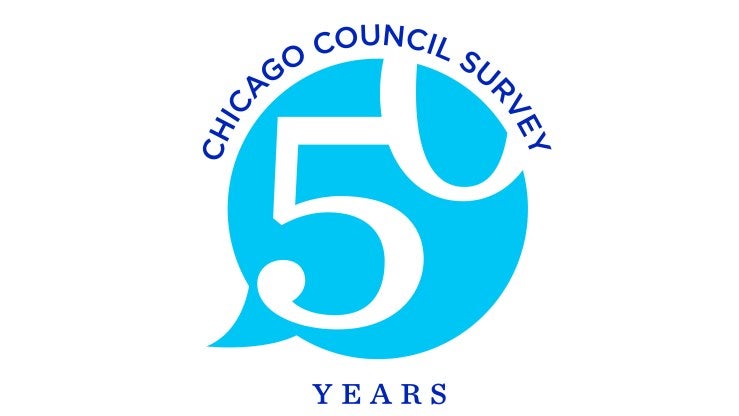
Related Content
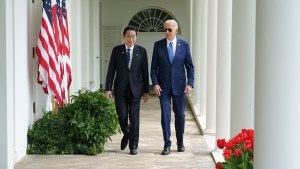 Public Opinion
Public Opinion
As US President Joe Biden hosts Japanese Prime Minister Fumio Kishida for a state visit, here’s what to know about US attitudes toward the alliance.
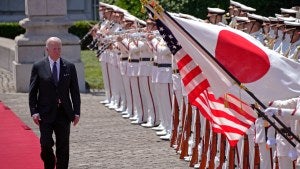 Public Opinion
Public Opinion
The US public views the Japan alliance as a significant national security benefit as concerns about China grow.
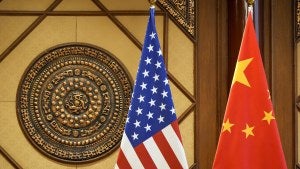 US Foreign Policy
US Foreign Policy
The public's top priorities for the US-China relationship moving forward: avoiding war and maintaining a technological edge.
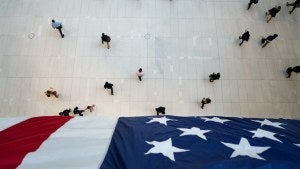 Public Opinion
Public Opinion
Results and analysis of the Council's annual survey of American views on foreign policy.
